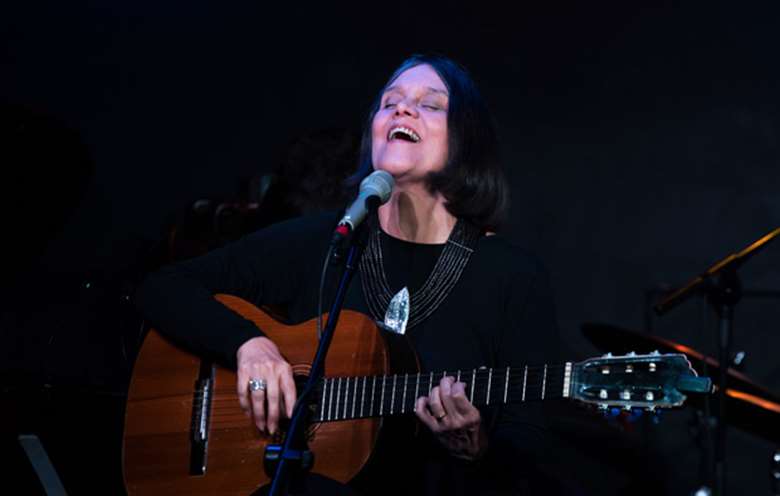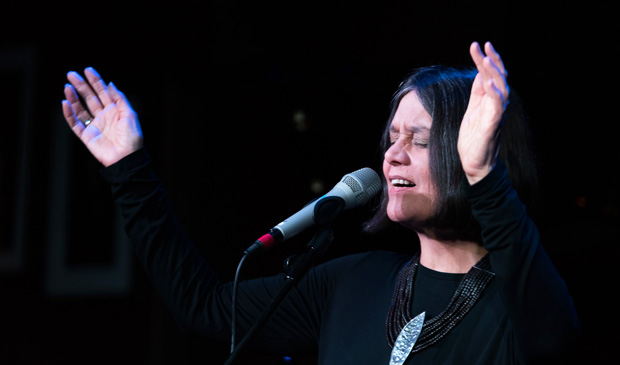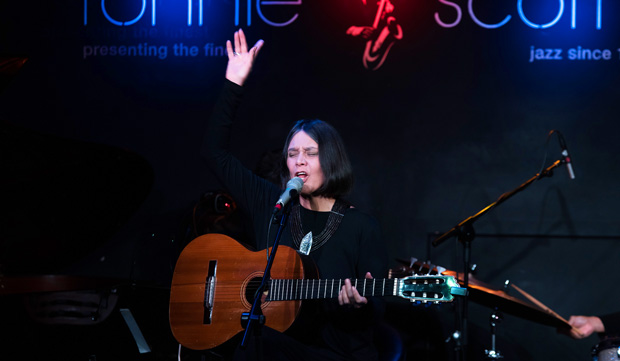Joyce bewitches with bossa nova at Ronnie Scott’s
Wednesday, January 14, 2015
Undoubtedly a great reservoir of rhythm Brazil is also a limitless source of melody.

The real musical genius of the country that gave the world bossa nova is the intricacy with which the two elements combine, and in the singer-songwriter-guitarist Joyce Moreno it has a prime exponent of the art. Throughout an evening in which the strength of the repertoire is matched by the skill of execution of a fine quartet in which pianist Helio Alves stands out the 66 year-old Carioca, soberly elegant in a black dress and chunky necklace, gives several startling displays of how percussive the verse and chorus of samba-led material can be. Very often her melody is rhythm.
On brisk numbers such as ‘O Morro Nao Tem Vez’, where drummer Tutty Moreno’s rimshots tap-dance on the pulse she skips through notes like a ballerina, spinning between crotchets and quavers over difficult chord changes to make the whole piece swish along with effortless ease. The rub is of course that, structurally, the music is anything but a cakewalk and Joyce’s razor sharp guitar work, both in terms of her time keeping and harmonic flourish is far superior to that of a vocalist who unwinds the odd arpeggio on a six-string. Then again some 45 years of experience that have yielded a discography garlanded by highlights such as 1969’s Encontro Marcado, 1980’s Feminina and 2001’s Gafeira Moderna make Joyce a veritable institution, an artist who really should be mentioned in the same breath as the Reginas, Gils and Velhosos.

The title of her current album Raiz means roots and in many ways the singer appears more connected than ever to the musical foundations – and their creative development – of her homeland. As she will demonstrate in the second set her original compositions, above all the jaunty ‘Penalty’, more than uphold the legacy of bossa’s progenitors such as Antonio Carlos Jobim and ‘his master’ Dori Caymmi but what raises her stock further is the consummate knowledge that she has of Brazilian composers, and the way that she can shed light on their lesser known glories. The perfect example, and arguably the highlight of the evening, is a rendition of ‘Canto De Yansan’, an ode to a deity from African derived religion written by the late Baden Powell, a virtuoso guitarist with the lyricism of a poet. The sombre, impassioned theme, full of long, fraught tones, sees Joyce explore the lower reaches of her range and produce a series of rasping, slightly rugged textures that perfectly capture the mysticism of the piece. It is a moment of high drama that draws a sharp intake of breath around the room.

The harder edges of the song mark a significant contrast with its underlying finesse, making the point that much of the appeal of Brazilian music lies in a brilliant tension between opposite poles. It is the rapid shifts from major to minor key, the entwining of joy and melancholy and the blend of restraint and exuberance. Advanced arrangements do not preclude dance. Which is why there are bodies swaying discreetly at many tables by the end of the evening, especially when the anchor of the rhythm section, the impressive bass guitarist Rodolfo Stroeter lets fly his funkiest ostinatos. But then again the deep engagement of the whole band with African-American music, above all jazz, frames the entire performance. Switch off for a moment and you’ll miss a delicious quote of Strayhorn-Ellington’s ‘Take The A Train’ right in the middle of Jobim’s ‘Desafinado’, but even if you don’t listen intently you can hear the spirit of Bill Evans and Miles Davis hovering gently over Joyce’s very natural poise. Her jazz is as jazz as her bossa nova is bossa nova.
– Kevin Le Gendre
– Photos by Ben Amure